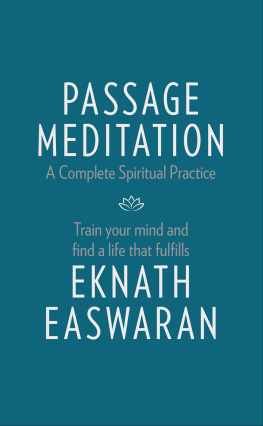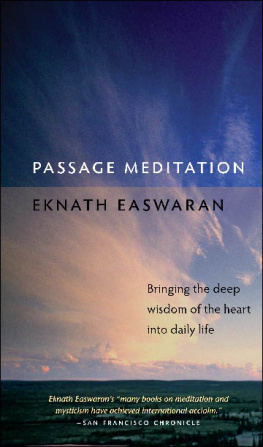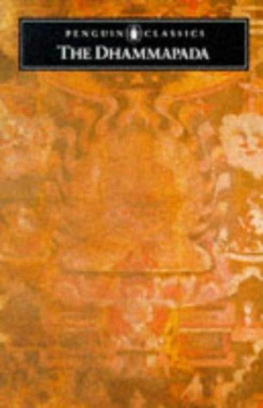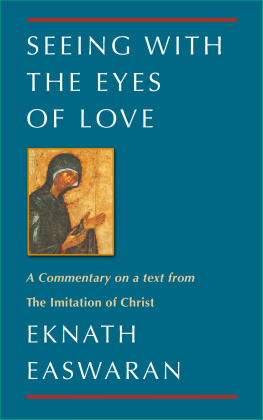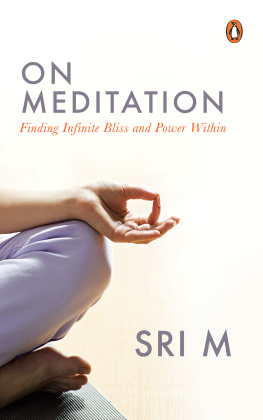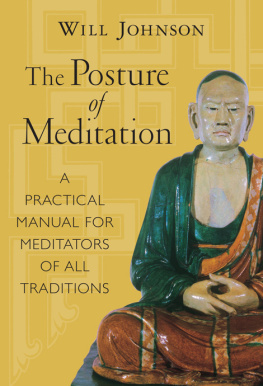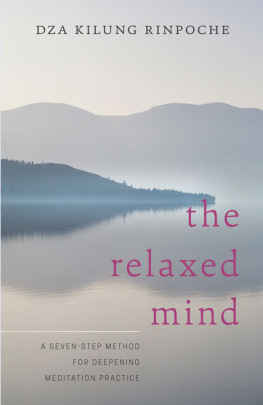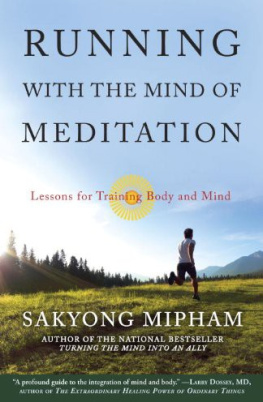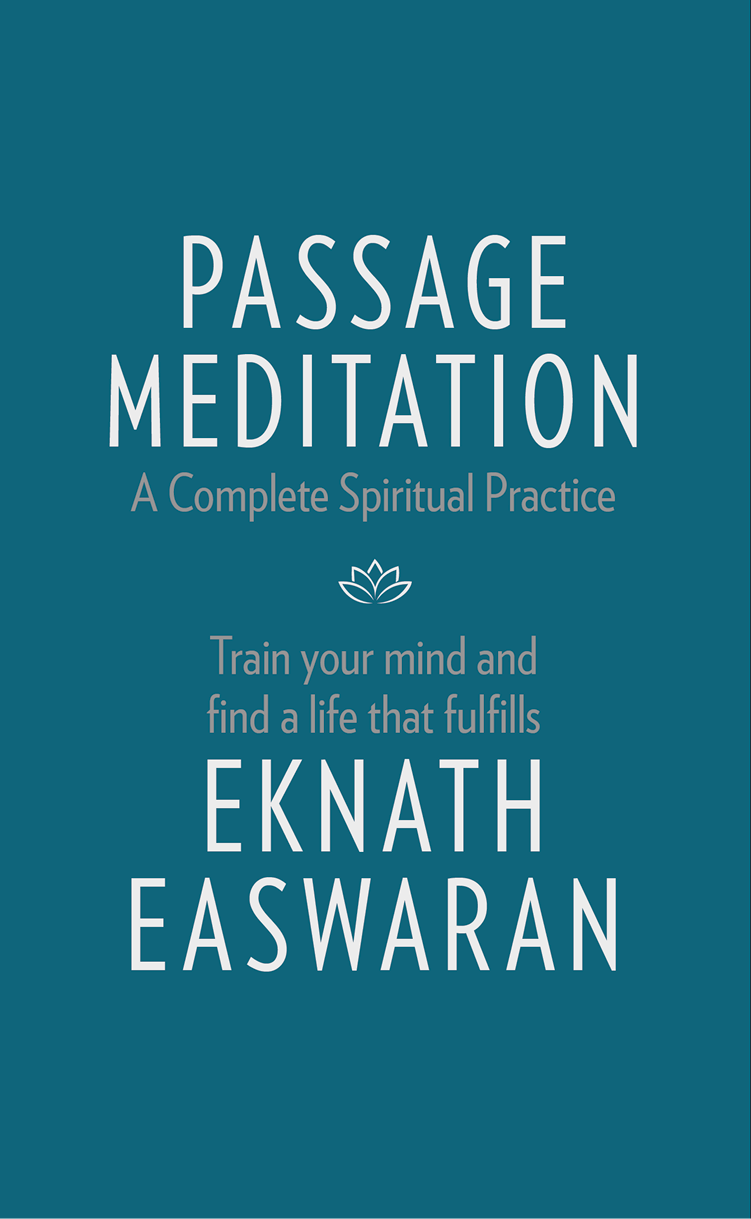PASSAGE MEDITATION

A dream is real so long as it lasts. When we awake, we do not pass from unreality to reality; we pass from a lower state of reality to a higher one. Is it not possible that there is a state of awareness higher still, compared with which the limited satisfactions of everyday life are no more lasting than a dream?
EKNATH EASWARAN
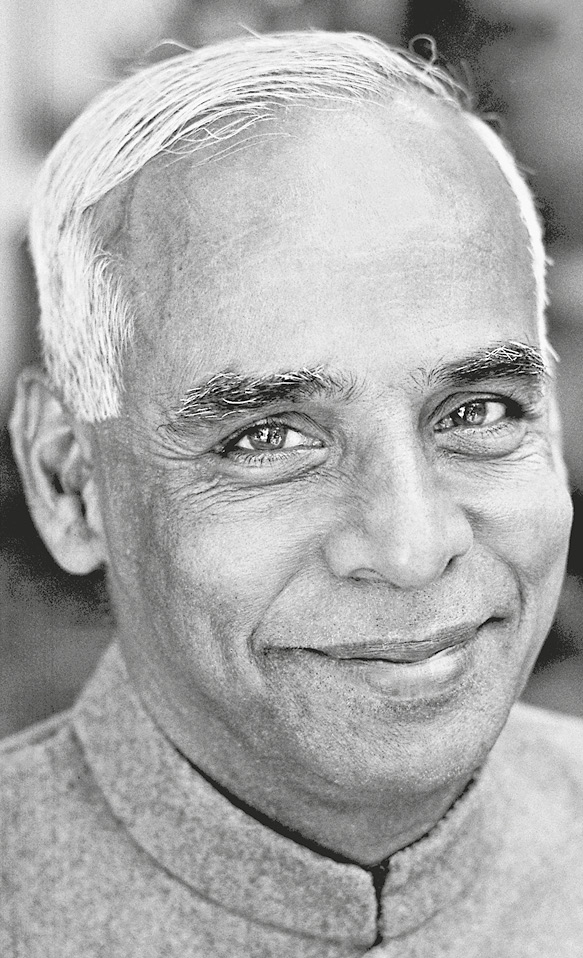
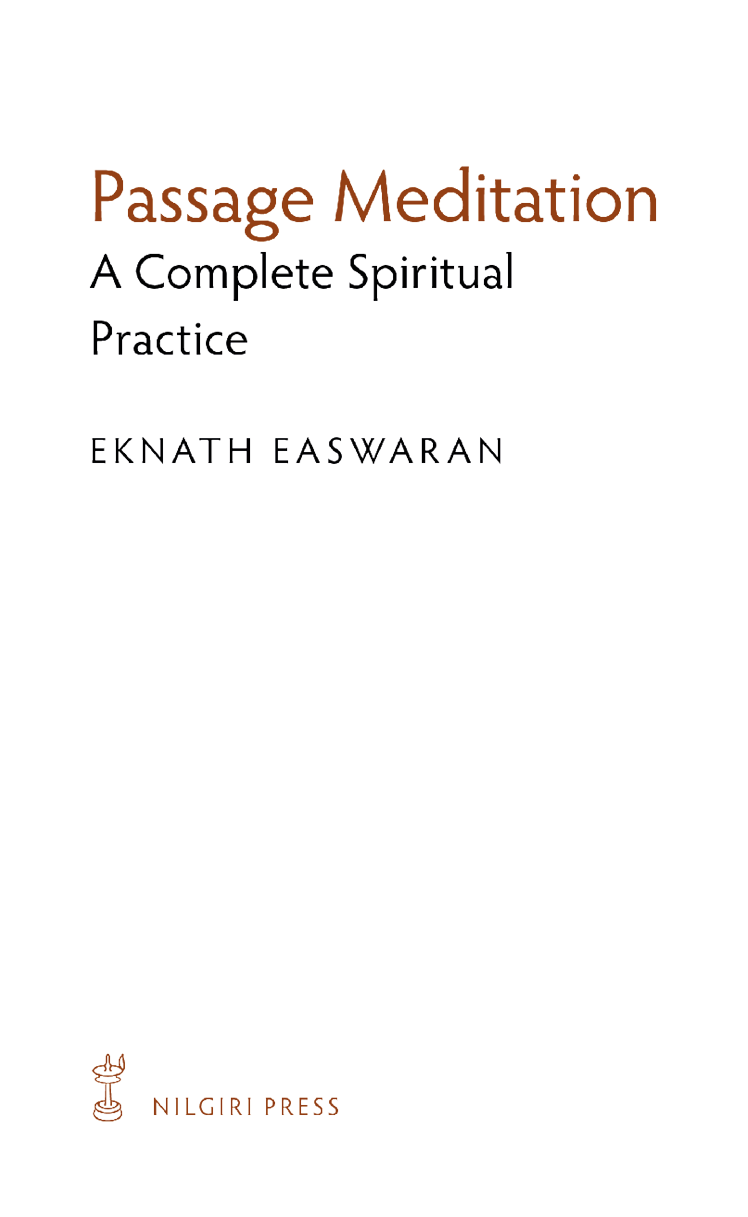
Copyright Page
20160705
1978, 1991, 2008, 2010, 2016 by
The Blue Mountain Center of Meditation
All rights reserved. Printed in Canada on recycled paper
First published 1978 as Meditation: Commonsense Directions for an Uncommon Life
Fourth edition. First printing September 2016
10 9 8 7 6 5 4 3 2 1
ISBN: 978-1-58638-116-5
eISBN: 978-1-58638-117-2
Audiobook ISBN: 978-1-58638-748-8
New material for this edition comes from the Centers archive of Eknath Easwarans teachings.
Library of Congress Control Number: 2016940667
Publishers Cataloging-In-Publication Data
(Prepared by The Donohue Group, Inc.)
Names: Eknath, Easwaran, 1910-1999.
Title: Passage meditation : a complete spiritual practice : train your mind and find a life that fulfills / Eknath Easwaran.
Other Titles: Meditation. 1978.
Description: Fourth edition. | Tomales, California : Nilgiri Press, [2016] | First published in 1978 as: Meditation: commonsense directions for an uncommon life. | Includes bibliographical references.
Identifiers: LCCN 2016940667 | ISBN 978-1-58638-116-5 | ISBN 978-1-58638-117-2 (ebook) | ISBN 978-1-58638-748-8 (audiobook)
Subjects: LCSH: Meditation. | Meditations.
Classification: LCC BL627 .E17 2016 | DDC 204/.35--dc23
Nilgiri Press is the publishing division of the Blue Mountain Center of Meditation, a nonprofit organization founded by Eknath Easwaran in 1961. The Center publishes Eknath Easwarans books, videos, and audios, and offers retreats on his eight-point program of passage meditation.
The Blue Mountain Center of Meditation
www.easwaran.org | info@easwaran.org
Box 256, Tomales, California 94971
Telephone: +1 707.878.2369 Toll-free: 800.475.2369
Table of Contents
Part I.
Passage Meditation:
An Eight-Point Program
Part II.
Questions and Answers
PREFACE 
Discovering Meditation
THIS IS THE book I wanted when I began to meditate direct, simple, practical, and based completely on personal experience. It presents the program I developed for myself in the midst of a very active life on a university campus in India, independent of any established tradition, and first taught systematically at the University of California, Berkeley, in 1968 probably the first course on meditation ever offered for credit at a major American university.
The method has come to be known as passage meditation because it involves slow, sustained attention on the words of inspired passages chosen from the wisdom literature of the world scriptures and mystics of all times and cultures. These passages do not belong to any creed or dogma. They are distilled from the experience of men and women who have sought, and discovered, a reality higher and deeper than the world of sense experience. All I have contributed to this legacy is a systematic program for drawing this deep wisdom of the heart into daily life.
Like the passages themselves, the principles and practices this book presents are timeless. But times differ, and our age cries out for universality. Passage meditation can be followed equally well in any religion or in none. It belongs to no movement, asks for no change of beliefs; it simply allows you to take the ideals you respond to and gradually, gracefully, make them part of your life.
I said I developed this program, yet it would be more accurate to say I discovered it. Like a buried treasure, it lay there waiting to be found when I needed it.
At that time, I can honestly say, meditation was the farthest thing from my mind. My days were full with a job I loved, teaching English literature on a beautiful college campus in central India. I had begun to make a reputation as a writer; I had friends with whom to enjoy music, theater, tennis, and the quiet pleasures of good company; everything I wanted was flowing into my hands. It was a very satisfying situation, and if I had had time to think about it, I would have assured you I was happy.
Instead, I was surprised to find myself feeling empty inside. Something deep could not be satisfied. Old, old questions began to come unbidden as I lay awake at night: Why am I here? What is life for? What happens when I die?
Nothing in my education had prepared me for such questions. Nothing I read could answer them for me. Only when I discovered meditation did I find the higher vantage I needed to see life whole and that discovery opened the door to a way of life so much more fulfilling that my days before seem like a dream.
As so often happens, it was death that precipitated the crisis. In a few short months, one after the other, I lost people passionately dear to me: Mahatma Gandhi, who had been my beacon since college; my beloved grandmother, my spiritual teacher; then a friend almost exactly my age. Systematically, every support I leaned on had been dashed away. With my world upside down, I came home from a walk one day and found that one of my dogs, who doted on me, had been run over by a passing truck. It was as if she stood for all of us: for Gandhi and Granny and everyone else who had died; for all of us still living, for whom death was simply biding time.
Instinctively, like so many before me, I turned to traditional wisdom. I was not at all religious, but at an early age I had fallen in love with Indias best-known scripture, the Bhagavad Gita, simply because of its poetry. I knew most of the verses by heart; nothing could be more natural than to turn to them in a time of crisis. I remember sitting down with eyes closed and letting the words roll through my consciousness:
Never was the Self born; never shall it
Cease to be. Without beginning or end,
Free from birth, free from death, and free from time,
How can the Self die when the body dies?
The words must have taken me in, because when I opened my eyes at last it had grown dark. Time had been suspended, and the burden of sorrow was gone. I felt as if I had returned from another world an inner realm beyond time and space where somehow I was at home.
Over the next few weeks I revisited those verses, and many others, in the same way, seated in silence in the early morning, drawn by the way the words nourished my consciousness and anchored my life. Gradually it dawned on me that there was ancient tradition behind what I was doing. I was meditating becoming absorbed in the words of the Gita just as I had seen Mahatma Gandhi doing years before. India had refined this to a science thousands of years ago, but I had known nothing of it. I had been looking everywhere for a treasure hidden at home.

